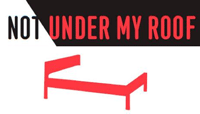 In her book Not Under My Roof: Parents, Teens and the Culture of Sex, sociologist Amy Schalet traces the roots of parents’ divergent attitudes, and explores the way family culture shapes not just sex but also alcohol consumption and parent-teen relationships. Her work challenges American parents — for whom teenage sex is something to be feared and forbidden, and often a source of family conflict — to consider different, and possible better ways to love, respect and care for our children.
In her book Not Under My Roof: Parents, Teens and the Culture of Sex, sociologist Amy Schalet traces the roots of parents’ divergent attitudes, and explores the way family culture shapes not just sex but also alcohol consumption and parent-teen relationships. Her work challenges American parents — for whom teenage sex is something to be feared and forbidden, and often a source of family conflict — to consider different, and possible better ways to love, respect and care for our children.
Schalet looks at child-rearing in the Netherlands, where the number of teenage pregnancies, abortions and incidences of HIV is far lower than in the United States; sexually active Dutch girls are also likely to have fewer sexual partners by the time they leave their teenage years behind. Avoiding caricatures of permissive Europeans and puritanical Americans, Schalet’s research shows that the “Dutch model,” where parents accept their minor children’s relationships and even let them have sleepovers with sex partners, results in much better health outcomes for teenagers.
American and Dutch cultures, Schalet writes, view the construction of the individual and the role of society at large very differently. The Dutch practice an “interdependent individualism” that takes into account the needs and feelings of others in the family and also in the society at large. Coming into one’s sexuality is perceived on the whole as a natural part of psychological and emotional development, one that can and should be integrated into family discussions.
This perspective is aided by the wider societal assumption that older teenagers will want to have sex, and that they’ll need to take precautions in order to avoid a pregnancy or STDs. Sex education is widely taught in the schools, contraception is easily accessible, and abortions (rarely utilized) are available and require parental consent only before the age of 16. Drinking is similarly considered an intimate way for the family to be together, thereby providing an opportunity for parents to witness and guide their teens’ drinking habits.
This attitude is in contrast to what Schalet calls “adversarial individualism” in the U.S., where American parents view teenagers as fundamentally rebellious and governed by “raging hormones.” They likewise view the sexes as inherently antagonistic in their aims: boys are out for sex, and girls for romance. American family life views adolescence as inherently about power struggles, inviting a parenting approach that emphasizes setting limits, choosing battles, and forbidding or greatly restricting participation in sex and substance use (i.e., holding them back from the precipice for as long as you possible can).
Writes Ann Swidler, of University of California, Berkeley: “Schalet challenges our assumptions about teenage sex and the inevitability of conflict between teenagers and parents. American adolescents rebel, and their parents impose harsh discipline because they prize individual autonomy and fear the social disorder it implies. Dutch parents expect their children to be reasonable, because they see self-regulation as a natural attribute of a cohesive society.”
* * *
See also: Another Problem With Porn